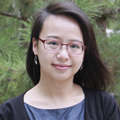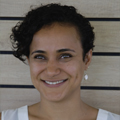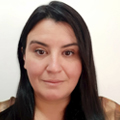This year at JEM, we are highlighting women in science by sharing their stories and amplifying their voices. In this Viewpoint, we hear from a cross section of women, across multiple research fields, discussing their science and the process of setting up a lab as an independent researcher. As well as being able to celebrate the positives of becoming an independent researcher, we would also like to use this platform to discuss the unique challenges they face as women scientists in their respective scientific environments. This Viewpoint is part of an ongoing series at JEM, and follow-up articles will be published in the coming months.
Emilie Grasset
Assistant Professor of Immunology in Pediatrics, Department of Pediatrics, Division of Pediatric Gastroenterology, Hepatology, and Nutrition, Drukier Institute for Children’s Health, Weill Cornell Medicine, New York, NY, USA

My name is Emilie Grasset, and my lab studies adipocyte–stromal–immune interactions in mucosal inflammation. Entering the tenure-track job market, I was told to reach out to everyone; people were happy to help, providing valuable advice and leads on where to apply! I got more interviews this way than through advertised positions. Leading a lab is very different from doing a postdoc. If you can, as I did, get experience with writing grants and protocols, managing and recruiting people, and/or budgeting during your postdoc; the learning curve to your new job will be less steep. You will need to do the above, and set up your lab, ideally while collaborating with new colleagues to become a valuable part of your department. Keeping track of your accomplishments and priorities helps you feel less overwhelmed. Remember that focusing on research and grants will get you promoted, and don’t forget to spend time on what recharges you!
Hiutung Chu
Assistant Professor, Department of Pathology, University of California, San Diego, San Diego, CA, USA

I am an Assistant Professor at UC San Diego and a first-generation college graduate. I established my research group in 2018, where we explore the dynamic interactions between commensal microbes and the host immune system. As new faculty members, we are often inundated with advice—including the need to establish your independence and carve out our own niche. Yet I think it's important to emphasize that independence does not mean isolation. This is the time to create your community. As a new principal investigator (PI), I have found my community with other new faculty members within and beyond my field who are navigating similar challenges—establishing their research groups, finding balance with seemingly endless tasks, commiserating about rejections, and celebrating every success, big or small. Having a community of peers to lean on during the transition to faculty, and as a new mother, was essential. Now, after a few years, it’s gratifying to celebrate grants, publications, and all the wins together. There will undoubtedly be more challenges ahead; make sure you take the time to find your people and build your community.
Wan-Lin Lo
University of Utah School of Medicine, Salt Lake City, UT, USA

In the summer of 2021, I established my lab at the University of Utah School of Medicine. We focus on the molecular mechanisms that enable T cells to mount immune responses and avoid autoimmunity. Before I started, a friend told me, “Utah is a great place to live.” Whenever I get enmeshed in deadlines, he sends me a photo from the mountains to remind me to “get out.” His excellent advice encourages me to maintain a balanced life, which helps me push through obstacles and turn my challenges into progress. As a PI, I have developed many new skills, such as management. However, some fundamental principles have endured and proven invaluable: I try to stay true to myself, be generous with others, and embrace each experience as part of the learning process. As an immunologist, I feel fortunate that many accomplished women already serve as role models in my field. I aim to continue their efforts and advocate for change that fosters greater inclusivity and more public outreach. Sharing my knowledge with my lab members brings me immense pleasure. I also find joy in their achievements and eagerly anticipate opportunities to share our research with the scientific community.
Carla Nowosad
Assistant Professor, Department of Pathology, Translational Immunology Center, NYU Langone Health, New York, NY, USA

I am a British immunologist studying mucosal B cells at New York University. Using innovative imaging approaches, my lab studies how B cells, and the antibodies they produce, evolve towards different stimuli in the complex environment of the intestine. Setting up the lab has been a whirlwind, with time seemingly moving at double speed! My most joyful moments have been when brand new data are generated from my team and when I proudly watch us contribute to the ecosystem of our department. My biggest personal challenge has been managing the sheer volume of decisions required of me daily, which have to be made quickly, accurately, and largely alone. Although daunting at first, over time it has truly crystallized my sense of self and created a strong vision for how I want to exist in academia. I was fortunate to have many inspiring mentors, and I remind myself of their advice often, especially the simple, timeless mantra: “Just do really good science, and everything else will be OK.”
Daniela Latorre
Swiss National Science Foundation PRIMA Group Leader, Human Neuroimmunology Laboratory, Institute of Microbiology, ETH Zurich, Zurich, Switzerland

The path towards my scientific independence has been recently facilitated by the obtainment of a competitive career grant from the Swiss National Science Foundation, along with additional research grants from ETH Zurich and other funding agencies, which allowed me to set up the Human Neuroimmunology laboratory at ETH Zurich in January 2020. Becoming an independent group leader took me out of my comfort zone, leading initially to a mixed feeling of excitement and fear. The main challenge for me was related to the COVID-19 pandemic, which caused the temporary shutdown of all research activities soon after the start of my independent laboratory, thus increasing uncertainty and forcing me to revise my short-term research plans. Despite such unfortunate circumstances, during the past 3 yr I have been able to deeply appreciate the possibility to independently shape a novel personal research line along with the formation of my new team of young students and network of collaborations. Becoming a PI requires the ability to combine, refine, and simultaneously apply organizational, management, and leadership skills, which may be quite challenging, although all those skills are already progressively acquired during earlier career stages. As a young PI, I have realized how critical it is to define the type of leader and mentor you want to be and how demanding this could be. I try to be a good mentor for my team of young immunologists by seeking to transmit my curiosity and enthusiasm for science while helping them reach their full potential. To me, witnessing their personal scientific growth is one of the most rewarding aspects of this job. Photo credit: Ph. Stefan Weiss and ETH Zürich.
Maike Frye
Professor of 3R Models and Vascular Biomedicine, Institute of Clinical Chemistry and Laboratory Medicine, University Medical Center Hamburg, Hamburg, Germany

My name is Maike Frye, and I am a vascular biologist. In 2018, I started as a junior research group leader at the University Medical Center Hamburg, and so far, 2022 has been the most exciting year, as my son Mads was born and I received full professorship. Starting a laboratory can be a lonely and stressful experience, but having people to talk to and share both the ups and downs with can make all the difference. One key factor that I believe contributed to my perseverance and success is my strong support network of friends and colleagues. Most of those people are at the same stage of their scientific career and have been invaluable in helping me navigate the early years of my career—from strategic discussions, collaborations, and conference fun to sharing the total excitement about new data, but also the disappointment of a grant rejection via late-night voice messages.
Smita Gopinath
Assistant Professor, Department of Immunology and Infectious Disease, Harvard T.H. Chan School of Public Health, Boston, MA, USA

I am a mucosal immunologist and microbiologist, and my lab studies the role of the vaginal microbiome on host immune homeostasis and protection against sexually transmitted infections. I started my position on April 1, 2020 (yes, I know). While starting a lab is a chaotic process at the best of times, this was completely exacerbated by the pandemic. Two anecdotes illustrate this: (1) We are still receiving orders placed in 2021, and (2) the first time I saw all my colleagues in one room was 1.5 yr into my lab.
Starting a lab has been an emotional roller coaster, and I am working on building coping mechanisms to hold on to the joys of science amidst the wastelands of bureaucracy. I have a “good moments” folder filled with news that I use to boost my spirits. Items include the first time we did an experiment I had been dreaming of for years and Slack messages from when my research assistants got into their dream graduate programs. This job also offers a lot of flexibility, which is something I try to pass on to my team. I have a child whose needs require a lot of appointments during the day, and I have found it relatively easy to navigate scheduling these with running a lab.
As a foreign student and postdoc in the US, I spent the last 20 yr perpetually uncertain of when I’d be able to see my family in India, held hostage to the vagaries of visa timelines. Getting my permanent residency last year gave a huge boost to my science and my mental health. Supporting our immigrant workforce is critical to building a robust and resilient scientific community.
Han-Yu Shih
National Eye Institute, National Institute of Health, Bethesda, MD, USA

I am Han-Yu Shih, a PI at the National Eye Institute at the National Institutes of Health. In 2019, I established my lab to study neuroimmune regulomes in neurodegenerative diseases, specifically Alzheimer’s, using cutting-edge techniques. Transitioning from being a mentee to a mentor was a significant change, requiring me to learn effective guidance and mentoring, which took practice and honing of my own personal style. However, working with a diverse group of trainees who bring unique perspectives to our research has been one of the most rewarding aspects of being a PI. I love witnessing their growth and overcoming obstacles to achieve tangible results, which brings me immense satisfaction, particularly through the power of teamwork. Being a female scientist presents additional challenges, such as balancing my roles as a researcher and a mother. Nevertheless, I am proud of the progress I have made in establishing my lab thanks to the unwavering support of my family and colleagues. I am thrilled to continue this exhilarating scientific exploration with my team as we contribute to the understanding of neurodegenerative diseases and strive to make a positive impact on human health.
Nadine Laguette
Centre National de la Recherche Scientifique Research Director, Institut de Génétique Moléculaire de Montpellier (IGMM), Montpellier University, Montpellier, France

I am a research director heading the Molecular Basis of Inflammation group in Montpellier. We are interested in the study of the molecular mechanisms governing inflammatory responses in physio-pathological contexts. I was lucky to grow up in a multicultural environment (Mauritius Island) where gender was not a predominant cognitive bias, and for a long time I did not feel that being a woman could limit my professional ambitions. It is only in leadership roles that I realized the difficulties women and other underrepresented minorities encounter: biased recruitments and career progression hindered by maternity leave, for example. There is much progress to be done in making research environments inclusive, and it is a matter every single one of us can act upon. The best advice I received upon setting up my lab was from my postdoc mentor, who never failed to believe in me: Do what you like to do, and you will excel at it. Applying this advice in the lab allows me to not only focus on the research avenues I enjoy wandering along, but also to look beyond cognitive biases and potential prejudice to focus on individual strengths.
Marta Toscano
Hospital Dr. Arturo Oñativia, Salta, Argentina

I am Dr. Marta Toscano, an Argentine immunologist and scientist dedicated to translational research. In 2019, I moved from one of the most prestigious research institutes in Buenos Aires to Dr. Oñativia Hospital in Salta, an inland province. This change marked a significant milestone in my career as an independent researcher and brought forth various challenges. Firstly, I reoriented my investigations from basic to translational research to meet the needs of healthcare professionals and patients. Secondly, I assembled a new team and secured resources for starting a new lab from scratch. In my forties, I proved to myself that it’s never too late to start over. Balancing these endeavors while being a single mother to a 7-yr-old daughter and caring for my 80-yr-old mother posed the most demanding challenge. I’m confident that all the effort will pay off and that working with my highly committed team in a fresh research environment will yield high-quality results in the coming years.




